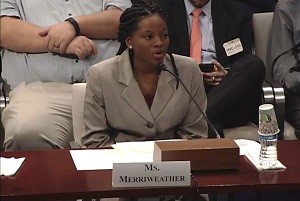by Denisha Merriweather
As a school choice graduate turned education advocate, I’ve shared my experience with legislators before, but never in the halls of Congress. That changed last month, when I had the honor of traveling to Washington to tell the story of my academic turnaround.

At the Rayburn Building on Capitol Hill, I gave a piece of myself to the 30 members of the House Committee on Education and the Workforce who had set a hearing to discuss school choice.
Just a couple months after passing the Every Student Succeeds Act, federal lawmakers are exploring the prospect of creating more options for students across the country. As Chairman John Kline noted in his introduction, “The committee has worked to improve K-12 education and has been guided by the belief that every child, regardless of where they come from or how much money their parents make, should receive an excellent education.”
Kline encouraged his colleagues to ask how they can support efforts in state capitols and local school districts to help more children receive the education they deserve. One member, Rep. Alma Adams of North Carolina, asked what I think is the crucial question: “How much work would have to be done to truly give all students and their families choice?”
Many members of the committee didn’t doubt that students needed options, and if they had criticisms of school choice, they focused on the importance of holding charter and private schools accountable.
I was listening for someone to outline a vision. How do we get from where we are to where we want to be?
In 1990, Milwaukee enacted its pioneering school choice program. Now, 22 states offer some variation of private school choice, and more could soon join the ranks. Meanwhile, Congress is preparing to decide the future of another program, the one it controls directly: The D.C. Opportunity Scholarship Program.
I wanted federal lawmakers to know that such options are necessary. Stories like mine show how simply having an option can make all the difference in someone’s life. More and more parents and guardians are asking about alternative means of education and are demanding that the money follow the child. It feels like their quiet screams are starting to be heard.
While the other speakers gave the committee a policy overview, I was there to provide a student’s perspective, based on experience. Once I gave my testimony, I was given a warm applause. I later learned this sort of gesture is somewhat unusual.
Many members greeted me with compliments and shared their own stories about school choice opportunities. The Republicans in the room seemed to have well-rounded knowledge of school choice, the history, and opposing views. However, I was surprised the same depth of knowledge seemed absent among members from the Democratic Party. Many asked questions about the basic make-up of school choice programs. Panelist Luis Huerta, of the Columbia Teachers College, had to mention multiple times that educational options vary by state.
I was taken aback when I received what felt like a sarcastic compliment from Rep. Marcia Fudge. She praised my testimony in one breath, then proceeded to explain that she represents “all students,” especially minorities who don’t have a voice. She said it was her duty to keep minority children in the public school system.
At that moment, I wished my story could have been joined by those of other students — tens of thousands in Florida alone — who had struggled but are now excelling thanks to educational options outside traditional public schools.
“All students.” Did that include us?
There is a new generation rising. Millennials like me are going to be the next presidents, members of Congress, state legislators, mayors. We’re already challenging the status quo. We’re skeptical of the political allegiances that defined older generations.
And surveys suggest the majority of my peers agree with me that students should have options.
It was encouraging to see Congress seek out a student’s perspective on school choice. And since I visited there have been positive signs federal lawmakers are serious about creating options, from supporters rallying around D.C. vouchers to Sen. John McCain’s new legislation.
Parents need to be empowered. They should take advantage of all the opportunities they have. The decision should be in their hands.
My fervent hope is that elected officials can embrace these basic principles, regardless of their political affiliation.


